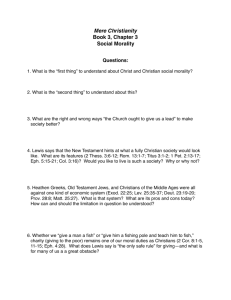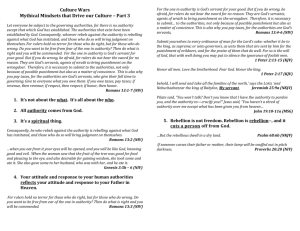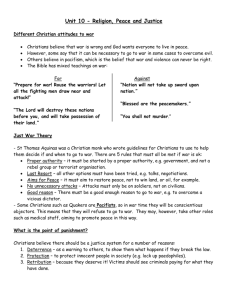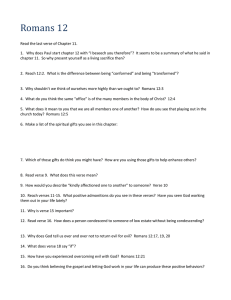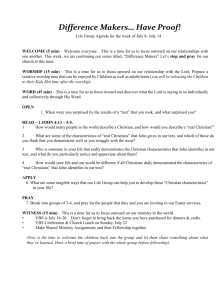Romans 13:1-2 - Christ Redeemer Lutheran Church
advertisement
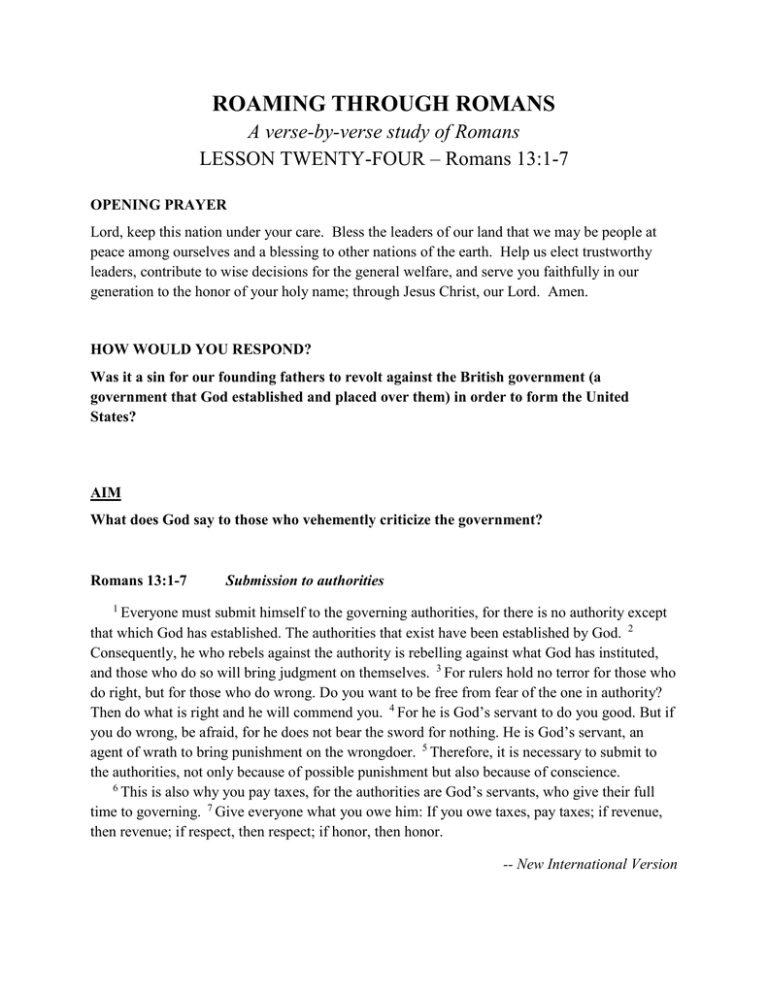
ROAMING THROUGH ROMANS A verse-by-verse study of Romans LESSON TWENTY-FOUR – Romans 13:1-7 OPENING PRAYER Lord, keep this nation under your care. Bless the leaders of our land that we may be people at peace among ourselves and a blessing to other nations of the earth. Help us elect trustworthy leaders, contribute to wise decisions for the general welfare, and serve you faithfully in our generation to the honor of your holy name; through Jesus Christ, our Lord. Amen. HOW WOULD YOU RESPOND? Was it a sin for our founding fathers to revolt against the British government (a government that God established and placed over them) in order to form the United States? AIM What does God say to those who vehemently criticize the government? Romans 13:1-7 Submission to authorities 1 Everyone must submit himself to the governing authorities, for there is no authority except that which God has established. The authorities that exist have been established by God. 2 Consequently, he who rebels against the authority is rebelling against what God has instituted, and those who do so will bring judgment on themselves. 3 For rulers hold no terror for those who do right, but for those who do wrong. Do you want to be free from fear of the one in authority? Then do what is right and he will commend you. 4 For he is God’s servant to do you good. But if you do wrong, be afraid, for he does not bear the sword for nothing. He is God’s servant, an agent of wrath to bring punishment on the wrongdoer. 5 Therefore, it is necessary to submit to the authorities, not only because of possible punishment but also because of conscience. 6 This is also why you pay taxes, for the authorities are God’s servants, who give their full time to governing. 7 Give everyone what you owe him: If you owe taxes, pay taxes; if revenue, then revenue; if respect, then respect; if honor, then honor. -- New International Version 2 Romans 13:1-2 1 Let every person continue to submit himself to the governing authorities. For authority does not exist except by God, and the authorities now in power are assigned by God. 2 Therefore, the one who continues to resist the authority has taken a stand against God’s direction, and those who do so will receive judgment to their own disadvantage. 1. According to verse 1, why we should obey all government officials? Because God put them there. 2. According to verse 2, if someone disobeys the government, who is that person ultimately disobeying? God. 3. What will be the result of such disobedience? That person will be punished by the courts. 4. What is God’s good and gracious purpose for placing authorities over us? Through government God provides an ordered structure in society to provide us with peace and order. 5. When Paul wrote this letter, Nero was the Roman emperor. What bearing does that have on Paul’s words? We are to respect all secular government. Even pagan rulers can carry out God’s will, for the worst government is better than the anarchy and chaos that occurs where people live without the order and protection given by God’s gift of government. In fact, an able unbeliever exercising an office in government may prove to be a greater blessing for the Christians living in that society than an unqualified believer. Romans 13:3-5 3 For the rulers are not a terror to the good work but to the bad. Now do you wish to be afraid of the authority? Keep on doing good things and the authority will praise you. 4 For the authority is God’s servant for your good. But if you keep on doing bad things, be afraid! For the authority does not bear the sword without cause. For the authority is God’s servant, an avenger for wrath to the one who continues to do bad things. 5 Therefore it is necessary to continue to be in submission not only because of this wrath but also because of your conscience. 6. How does our government work good in our lives right now? Protection against tyranny through a constitutional government that separates the legislative, judicial and executive branches and provides checks and balances so that no one group becomes too powerful Freedom of expression The right to practice our religion without fear and punishment 3 Favorable tax treatment for charitable donations The right to Christian education The right to a public jury trial The right to petition for redress The right to be secure in our bodies and property Legal recognition for marriage and parental rights Old-age pension Basic medical care A police forces that serves and protects rather than one that spies on its citizens Well-equipped national defense force 7. Who alone is to suffer at the hands of government? Those who do bad. 8. Look at verse 4. Since God has commanded us not to murder, can the government execute a criminal? Yes. Just as God entrusts a bit of His authority to parents as they raise their children, so God has given a bit of His authority to government as they seek to keep order and protect their citizens. While God forbids personal vengeance, the government is His tool to inflict justice on those who hard others. That is why God has entrusted to governments the power of “the sword” (verse 4). The authority of “the sword” empowers governments to punish wrongdoers, even to the point of requiring their lives for violating the safety and security of others. 9. In verse 5, what two reasons are given for always obeying the government? 1) So you don’t get punished 2) Your conscience tells you to because they are God’s representatives; therefore it’s the right thing to do. 10. Read Acts 5:27-30. What is the only God-pleasing time we can disobey authority? Acts 5:27-29. 27 Having brought the apostles, they [the temple guards] made them appear before the Sanhedrin to be questioned by the high priest. 28 “We gave you strict orders not to teach in this name,” he said. “Yet you have filled Jerusalem with your teaching and determined to make us guilt of this man’s blood. 29 Peter and the other apostles replied: “We must obey God rather than men!” The only time we can disobey authority is when they order us to do something contrary to God’s Word. 4 11. Give examples that prove the expression, “Just because it’s legal doesn’t make it right.” Abortion Un-Scriptural divorce Frivolous lawsuits Gambling Homosexual “marriage” Sexual promiscuity Pornography 12. How might a Christian register his/her views on abortion without violating Scriptural principles concerning respect for government. Personally witnessing to expectant mothers Writing letters to editors of newspapers and magazines, and to legislators Legal picketing Political action, including voting for pro-life candidates Calling for a constitutional amendment protecting all human life at conception Romans 13:6-7 this reason also keep on paying taxes, for they are God’s public servants who are constantly attending to this very thing [public service]. 7 Give to everyone their dues: income tax to whom income tax [is due], sales tax to whom sales tax [is due], respect to whom respect [is due], honor to whom honor [is due]. 6 For 13. In verse 6, why does Paul say paying taxes is a blessing? So that government officials can devote all their time serving and benefiting society. 14. In verse 7, the examples of obedience given can be grouped into two categories. What are they? Outward and inward obedience. 15. Agree or Disagree? I have a right to grumble if my taxes are too high. If the taxes are too high because of proven governmental mishandling of funds, then don’t grumble—do something about it! If you just don’t want to pay more taxes, and the taxes are going up at the standard rate of inflation, then you’re just being greedy. 16. Agree or Disagree? It is always wrong to laugh at the late night comedians’ jokes about the President. It depends on the attitude presented by the one joking. If the joke is Chevy Chase falling because President Ford just slipped down the stairs, that’s one thing. We can laugh it off. But if Chevy Chase repeatedly portrays President Ford as a bumbling idiot, that is entirely another matter, one which we can’t laugh off. 5 17. Discuss the following quote: “The key to a Christian view of citizenship is moderation and a balance between the extreme of placing too much trust and energy into human efforts to improve the world and the opposite error of sitting back and doing nothing because we feel that the situation is hopeless.” (John Brug, “The Lutheran Doctrine of the Two Kingdoms.” Our Great Heritage, Vol. 2, p.386) Because of sinful human nature, the human will not usually find perfect solutions to every problem, and even good programs will be abused by some who seek selfish advantage. Nevertheless, Christians participate as “light” and “salt” to influence government policy to reflect God-pleasing solutions to society’s problems. 18. How important are your Christian values when you decide on a presidential candidate for which to vote? Answers will vary, but Christians can hardly ignore the candidates’ position on moral issues such as abortion, gays, marriage, and the family. 19. Why doesn’t our church take public stands on important social issues? The church has been entrusted with just one mission in this world: to proclaim the gospel so that souls might be brought to faith and strengthened in faith. The improvement of society through a more just and honest social order is the task of government. God has not entrusted to His church the task of promoting a better social policy. Yet individual Christians have two citizenships. Our most blessed “citizenship is in heaven” (Philippians 3:20), which Jesus has freely given to us by His life, death and resurrection. But God has also blessed each of us with a role as a citizen of an earthly nation. Individual Christians or groups of Christians have a deep concern if our society and our government are guilty of injustice towards anyone. Christians have the privilege and obligation to work toward equal justice and social improvement. The church will work to encourage Christians to be the best citizens any country could have. As Christian citizens reflect the mercy of their merciful Father in heaven, they will look for ways to reflect His compassion and justice. Those efforts will also create opportunities to witness to what is most important, the kingdom of heaven. 6 IS THIS HOW YOU RESPONDED? Q: Was it a sin for our founding fathers to revolt against the British government (a government that God established and placed over them) in order to form the United States? A: Your question is a fair one, but one that is not easily answered to the satisfaction of all believers (much less citizens in general). The Bible basically speaks of existing governments or rulers as legitimate ones whom God has allowed to be in power. Romans 13:1-7, Daniel 2:21, 37 and Daniel 4:17,25,32 speak this way. In his providence, when God allows a ruler or government to be in the position of authority, the normal (and safe) assumption among the citizens is to recognize this as legitimate government. All this would argue that the British government at the time of the American Revolution was a legitimate one and that rebellion was not biblically permitted for the colonists. Nevertheless, the question that has been (and will probably continue to be) debated is whether the British government under King George III held legitimate rule over the American colonies. The major grievance of the colonists was that of "taxation without representation" which they took to be an illegitimate stealing from the colonists and an immoral abuse of authority. Is that enough to label a government as "illegitimate"? The Bible will not directly say so, but allows that wicked people may rule, may be a test and burden upon godly people, and even in their wickedness remain legitimate rulers. The point is also often made that the colonies already had their own legitimate government -- elected leaders in place as their representatives. So it was a matter of two "legitimate" governments clashing. The opinions on the American Revolution are many and varied. Most who debate these issues admit the truth of the old saying: "One man's terrorist is another man's patriot." They then leave the ultimate conclusion to the individual citizen. Generally speaking, Christians are among the most hesitant to label any government as illegitimate and to advocate rebellion or anarchy. But, ironically, when a new government assumes power to replace the former one, Christians would be the first to recognize it as legitimate and will strive under God to be good citizens. Christians look first and foremost to pleasing their Lord and acknowledging his rule over everyone and everything. Only secondarily do they presume to determine who are legitimate or illegitimate rulers. And they will seek contentment under the rule of whomever the Lord allows to be in office. (And in countries like the US, as citizens, they will lawfully seek changes in officials and laws that they believe will best serve them and their neighbor.) WELS Q & A: Government/Society/American Revolution www.wels.net Posted 10/22/08 7 WHAT I’VE LEARNED To those who vehemently criticize the government, God says they are not only sinning against their leaders but also against God, who put those leaders in power for the people’s welfare. Therefore, a Christian will always honor and obey the governmental authorities. CLOSING PRAYER God bless our native land! Firm may she ever stand Through storm and night! When the wild tempests rave, Ruler of wind and wave, Do Thou our country save By Thy great might. For her our prayers shall rise To God above the skies; On Him we wait. Thou who art every nigh, Guarding with watchful eye, To Thee aloud we cry, God save the State! Amen. (CW 619)
